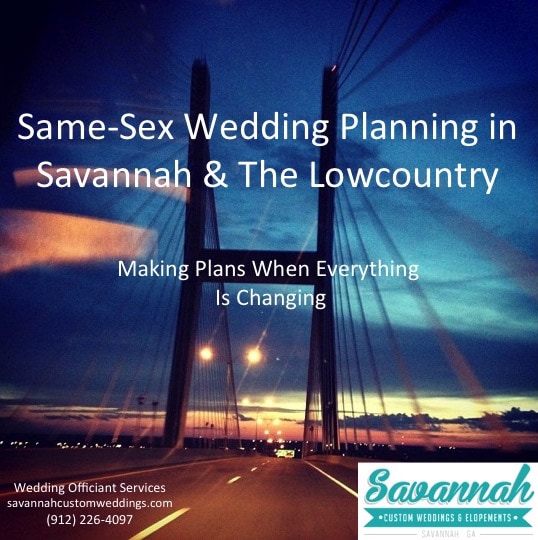UPDATE ON 6/26/15: The United States Supreme Court ruled that same-sex marriage is legal in all 50 states! If you would like to learn how I can help you get married, please read about the officiating services I offer!
This blog post went through dozens of updates as I tracked the legal battles in Georgia, South Carolina, & Florida from October 2014 to June 2015. I am not going to delete it, but most of the information is outdated as of the SCOTUS ruling. The bottom line is that same-sex couples can get married anywhere they’d like. Woo hoo!
——————-
ORIGINAL POST:
You might decide not to have a “wedding,” but marriage is still a big deal.
It may not seem like receiving that official piece of paper will change things for you and your partner, but it absolutely will. There are spiritual and emotional transformations that come from making your commitment, of course, but just the legal implications can be life changing.
In the United States, the legal shifts you experience as part of marriage are almost all positive. It’s in the government’s best interest for us to have families because families make us happier (!), and more productive workers and citizens. Legal marriage impacts your access to health insurance, your tax liability, and your ability to assign ownership to property and other assets. It also can determine your eligibility to be a parent and add to your family.
So yes, marriage is a big deal. It’s why people have been fighting for the right to its benefits for lesbian, gay, bisexual and transgender (LGBT) individuals all over the country, as well as in Georgia.
On Monday, October 6, 2014, the Supreme Court declined to hear appeals from five states with gay marriage bans that had been ruled unconstitutional by lower federal courts. This decision led to rapid changes in same-sex marriage laws, including the following:
- Same-sex marriage became legal in our neighboring state South Carolina on November 20, 2014. South Carolina is just a few miles away from Savannah via the Talmadge Bridge.
- As of January 6, 2014, same-sex marriage is also legal in Florida, just a two hour drive away.
- Same sex marriage also became legal in North Carolina this fall. While further away, Asheville is still just a 5 hour drive from us.
- Finally, on January, 16, 2015 the Supreme Court decided to hear arguments concerning four same-sex marriage cases. Arguments will be heard beginning April 28, 2015 and the outcome of these hearings could decide marriage equality for the entire country by June.
If you are an LGBT individual in Georgia, you might have been planning a commitment ceremony within the next year or waiting for the same-sex marriage laws to change. The changing laws in states around us may have led you wonder if any of this should impact your wedding planning. With that in mind, I’ve put together the following Q&A to help you with your decision-making, including key dates to track, reading suggestions, and social media accounts to follow. I warn you that in an effort to be thorough, this post is epically long.
As things change, I’ll update the post at the bottom and strikethrough or delete outdated information. I am not a lawyer, but a professional wedding officiant who works with all sorts of couples, and an advocate for anyone who wants to legally bind his or her love to their partner in a meaningful way. That’s reason enough for me to stay on top of this! If you are an attorney or same-sex couple, who would like to add your advice or story to this post, please contact me.
Q: Is same-sex marriage legal in Georgia? If not, what is going on to make that so?
Same-sex marriage is NOT currently recognized in Georgia. It is banned by state law. In April 2014, a group of LGBT plaintiffs filed a lawsuit against Georgia in the federal court system because they believe the state’s same-sex marriage ban violates their federal constitutional rights. Their goal is to have the state ban overturned.
Georgia’s attorney general filed paperwork related to dismissing the case on October 22nd, but the judge has not yet responded. On January 19, 2015, federal Judge Duffey of the 11th Circuit denied the State of Georgia’s motion to dismiss the case. On February 4th, the 11th Circuit Court of Appeals stayed further action on this case until after the Supreme Court case is settled.
Georgia was one of the last states where a same-sex marriage ban was challenged in court (it’s now happened in all 50). As of January 28th, Georgia is one of only 3 states in the country where a court has not ruled on a same-sex marriage case (the others are North Dakota and Nebraska).
Key Dates: October 22nd Waiting for next steps from Judge since October 23rd Waiting for a hearing date and response from the State of Georgia Waiting for Supreme Court case on April 28
Further Reading Suggestions:
- Georgia’s Plaintiff Profiles
- Snellville couple fight for their family in Georgia’s marriage equality lawsuit
- Lambda Legal responds to Olens motion to dismiss Georgia marriage equality suit
- Added on 1/12/15: Federal judge denies motion to dismiss Georgia’s same-sex marriage lawsuit
- Added on 1/28/15: Supreme Court Will Hear Four Cases Challenging Same-Sex Marriage Bans
- Added on 1/28/15: Lambda Legal agrees with motion to stay Georgia gay marriage case until after high court rules
- Added on 3/23/15: 11th Circuit Court punts Georgia gay marriage case to Supreme Court
I also suggest creating a Google Alert for “Georgia marriage equality” so you can get updates as they break. You can also create a Google Alert for the case name, “Inniss v. Aderhold.”
Q: How likely is it that same-sex marriage will be legal in Georgia?
Based on the consistency of previous rulings by the federal courts, experts believe that it is very likely that Georgia’s same-sex marriage ban will be ruled illegal once the current case makes it’s way through the system.
The legality of same-sex marriage in Georgia is now in the hands of the Supreme Court. Experts believe that the court will rule against the remaining states’ same-sex marriage bans, paving the way for marriage in Georgia. Same-sex marriage is legal in 37 states and the court has made a number of pro-marriage equality rulings in the past. It seems improbable that the Supreme Court would allow same-sex marriage bans to continue to exist in the small number of states who still have them.
Further Reading Suggestions:
- Georgia Attorney General Olens says gay marriage ban is constitutional
- Added 1/28/15: Marriage of Convenience
- Added 3/23/15: Marriage Equality Is Coming To America This June
Q: Are there other states I should be watching that impact the legal status of same-sex marriage in Georgia?
Not currently. The 11th Circuit Court covers Georgia, Florida and Alabama and rulings by the Circuit Court of Appeals can impact all states within the circuit. However, the 11th Circuit Court of Appeals has stayed all cases in these states that impact marriage equality until after the same-sex marriage case before the Supreme Court is decided.
However, Florida and Alabama have had their cases heard.
Gay marriage is now legal in Florida. Florida had its day in court on August 21, when Judge Robert Hinkle of the 11th circuit ruled that Florida’s same-sex marriage ban is unconstitutional. However, the judge stayed the decision until January 5th.
Attorney General Pam Bondi in Florida has appealed the ruling that threw out Florida’s ban on same-sex marriage to the United States Court of Appeals for the 11th Circuit, but it has been put on hold.
A federal judge threw out Alabama’s same-sex marriage ban on January 23rd and couples began marrying in early February. However, the Alabama State Supreme Court issued a conflicting order on March 3rd that prohibited county judges from issuing marriage licenses to same-sex couples which effectively put marriage back on hold, pending further legal action.
Key Dates: October 15th, November 15th, November 21st, January 5th, Waiting for updates on Florida’s appeal before the 11th circuit Waiting for Supreme Court case on April 28
Further Reading Suggestions:
- Lambda Legal, experts weigh in on Supreme Court decision’s effect on Georgia marriage case
- Added on 1/12/15: Same-sex marriages in thirty-sixth state: Florida
- Added on 1/28/15: No Same-Sex Marriages In Alabama On Monday, Under Federal Judge’s Order
Q: I had never considered getting married out-of-state before because it seemed so expensive, but South Carolina is a short drive away. Now that same-sex marriage is legal in South Carolina (and Florida), should we plan our wedding there instead of having a commitment ceremony in Georgia? What are the benefits?
(FYI: I have written another blog post on the legal benefits of marriage- straight or same-sex- called “If You Like It, Sign a Piece of Paper With It.”)
We all want marriage to be legal in Georgia. However, if you marry in a state where same-sex is legal, you will still experience benefits even though your state does not legally recognize your marriage. For some, that is the best decision to make right now for yourself and your family.
If you legally marry out of state, you’ll receive the federal benefits that come from marriage. The federal government agencies that will recognize your marriage and provide you the benefits that come with it are the IRS and U.S. Citizenship and Immigration Services.
The Social Security Administration will NOT recognize your marriage.
You may or may not receive health insurance as a family, depending on your employer. Some national employers recognize out-of-state same sex marriages that are not recognized in the state the employee resides. You should speak to your employer about their policy. As of January 1, 2015, your same-sex marriage WILL be recognized for health care obtained through an exchange (Obamacare), even if your current state does not recognize it.
Of course, you will not receive benefits governed by the state, including those that concern property and adoptions. However, if same-sex marriage was to become legal in Georgia, you would then receive those state benefits with your now-recognized out-of-state marriage. You would not have to marry again in Georgia.
And of course, there are other benefits to marriage. I asked some friends who lived in states where same-sex marriage was not legal and decided to get married out-of-state for their thoughts.
This is what my friends Leah & Rachel had to say. Some of their answers made me choke up. Bolded emphasis on certain statements was added by me.
Me: What prompted you to decide to get married out of state?
L&R: I wanted to get married in my home state (Massachusetts) and a town (Provincetown) that would be a good destination for guests, but also because we lived in a state that did not yet have marriage equality at the time (New York).
We both felt really strongly about having our celebration in a place that would welcome and affirm our relationship as equal to any other. We wanted to be married – not civilly-unioned or domestically partnered. That word holds so much meaning in our society we didn’t want to settle for “marriage-lite”
Me: Were there any immediate benefits you felt or experienced after returning home? Any hurdles?
L&R: Being able to change our names without having to go to court and file a petition was a big deal for us. Our new last name represented us as a family.
Even though we lived in a state that recognized out-of-state marriages, we had some trouble at a New York social security office – sometimes the processes at the state and federal level take time to catch up. Luckily we knew the law and were able to advocate for ourselves.
After marriage equality passed in NY, we ended up moving to Colorado, which at the the time had very limited state-wide relationship recognition laws, to work with the Gill Foundation, which was front and center in the marriage equality movement. Colorado is Rachel’s home state, so we were both very invested both personally and professionally in seeing marriage equality advance here. Because of changes in DC, we were able to be married in the eyes of the federal government – which makes a huge difference for us with taxes, social security, and health insurance costs.
Eventually a state-wide civil union bill passed in Colorado, which made some things better, but also created a sort of patchwork of protections, especially when our twins were born. Couples in a civil union are presumed to be the parents of children born during the relationship, so I was listed on their birth certificate. But states that don’t recognize our relationship may not recognize my status as a parent. A second parent adoption is legally binding across all 50 states but the twins have 2 legal parents according to Colorado, so it’s not currently an option. National marriage equality will solve this in the long run, but for now, it is nice to know that there are more states we can travel to or live in without worrying about or rights as a parent.
Me: Anything you wish you’d known before you planned your wedding?
L&R: We originally picked our wedding location because it was a very gay friendly place we loved spending time in, but I think I underestimated how important having the legal designation of marriage would be. We definitely got choked up when we received our marriage license – way more so than when we received our domestic partnership form. Being married means something – it means we are a family and no other word or list of protections can equal that. I never get tired of calling Rachel my wife and now she’s my wife in 30 states. That feels like progress to me.
Q: Okay, that was helpful. I think I want to get married in South Carolina or Florida and not wait for the Georgia case to resolve itself. What are my options?
If you and your family are comfortable with the short drive to Hilton Head or Beaufort County, there are many wonderful venues and wedding professionals who can help you plan your day there. There are also many Savannah wedding professionals who work in South Carolina because it is so close (I am one of them). You should be able to proceed with ease.
If you would like to have a formal event in Georgia because it’s your home, you can also consider eloping in South Carolina before your formal wedding. You can then have your legal marriage AND your Georgia commitment ceremony as a day to have a more personal ceremony and celebration with family and friends.
If you are considering this option, here are the requirements for a marriage license in Beaufort and Charleston Counties. Both applicants must apply in person. Unlike Georgia, there is a 24-hour waiting period between applying for your license and having it issued. An officiant can marry you the same day that you receive your license.
You could drive an hour to Beaufort on a Thursday and drive back on a Friday to get married, or plan a long, romantic weekend in South Carolina before your formal wedding together. It could also be a wonderful way to spend some time together alone before your big (but probably hectic) day.
You can also get married in Florida and North Carolina. Here are the requirements for Duval County in Florida. There is a three day waiting period without a premarital education course.
Q: I am curious… how did gay marriage become legal in South Carolina?
These are excerpts from the original blog post.
On October 8th, a county court accepted marriage applications from LGBT couples because of the October 6th Supreme Court declination to hear further appeals of a Fourth Circuit ruling that declared same-sex marriage bans unconstitutional (South Carolina is in the Fourth Circuit). The South Carolina State Supreme Court required counties to stop accepting applications pending an official ruling from the Fourth Circuit on South Carolina’s case.
A couple filed federal suit requesting an injunction that would allow same sex-marriage to move forward immediately. On November 12, Judge Mark Gergel ruled that South Carolina’s ban on gay marriages was unconstitutional and that effective November 20th, county courts must begin issuing marriage licenses to same-sex couples who otherwise meet the requirements to get married. The Supreme Court refused to hear all appeals.
On November 18th, Judge Childs also ruled that under the constitution, same-sex marriages performed out of state must be recognized by South Carolina immediately.
Further Reading Suggestions:
- Same-Sex Marriage Ruling Echoes as West Virginia Relents and South Carolina Persists
- South Carolina Supreme Court Blocks Marriage Equality Until Federal Ruling
- Added on 10/15: Marriage case judge Childs known as hard worker
- Added on 11/13: Federal judge looks favorably at Lexington same-sex couple’s suit (about recognizing same-sex marriages)
- Added on 11/13: Federal Judge Strikes Down South Carolina’s Same-Sex Marriage Ban (about marriage licenses issued in South Carolina)
Q: Where else should I look for updates on the changing legal status of same-sex marriage in the lowcountry?
I would suggest Southerners for the Freedom to Marry on Facebook, Georgia Equality on Facebook and The Campaign for Southern Equality on Twitter.
You can also follow the local news, but reports coming from these outlets has varied in accuracy, and many are not even covering the issue. I’d stick to organizations and publications that are following the legal issues closely. A great news site for this issue is GAVoice. The best reporter I have found is Chris Geidner at Buzzfeed.
I hope this blog post gives Georgia LGBT couples who are ready to get hitched some clarity so they can move forward with their marriage and wedding plans… or decide to continue to wait for Georgia to overturn its ban on same-sex marriage, which is okay, too. If there is anything else I can do to help you, please send me a note!
With love,

POST UPDATES:
2014
OCTOBER 15 UPDATE: Updated court dates for Florida and South Carolina and added a profile of the judge overseeing the South Carolina case in the 4th circuit.
OCTOBER 24 UPDATES: Updates on motions filed in Georgia and South Carolina this week, as well as a new federal suit filed in South Carolina seeking immediate recognition of the 4th circuit ruling.
NOVEMBER 13 UPDATES: Updates on January 5th stay in Florida case and both cases in South Carolina.
NOVEMBER 20 UPDATES: Updated the victories for South Carolina that allows same-sex marriage to proceed and requires recognition of out-of-state marriages.
2015
JANUARY 12 UPDATES: Updated information on Florida and the denial of Georgia’s motion to dismiss.
MARCH 23 UPDATES: Updated information on 11th Circuit Court of Appeals stay, the April 28 Supreme Court hearing, and status of Alabama’s case.
JUNE 26 UPDATE: It’s now legal everywhere, including Georgia!





